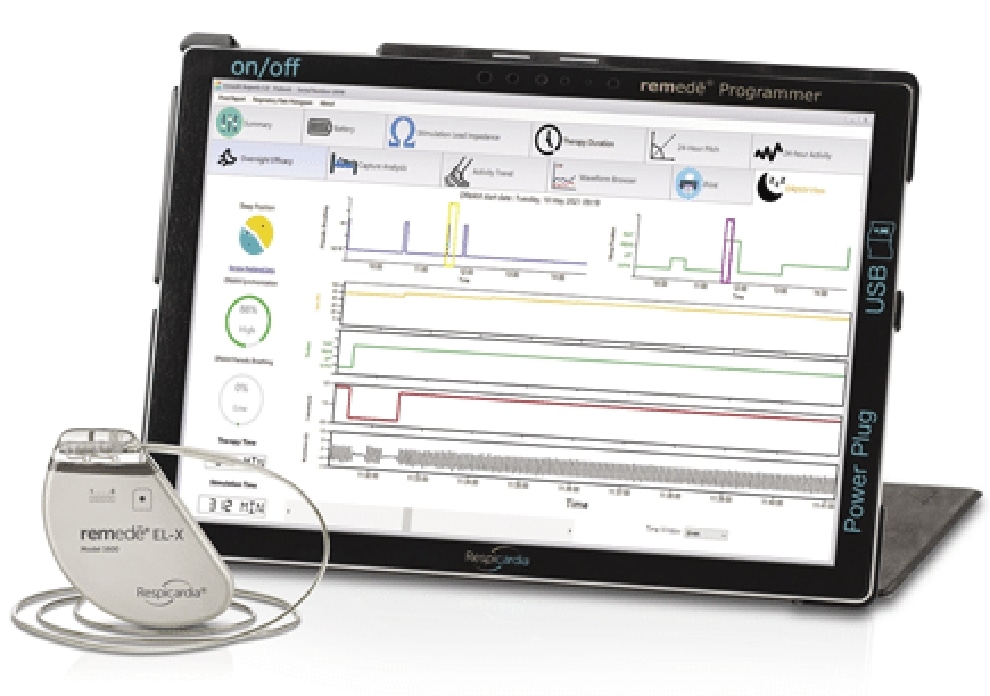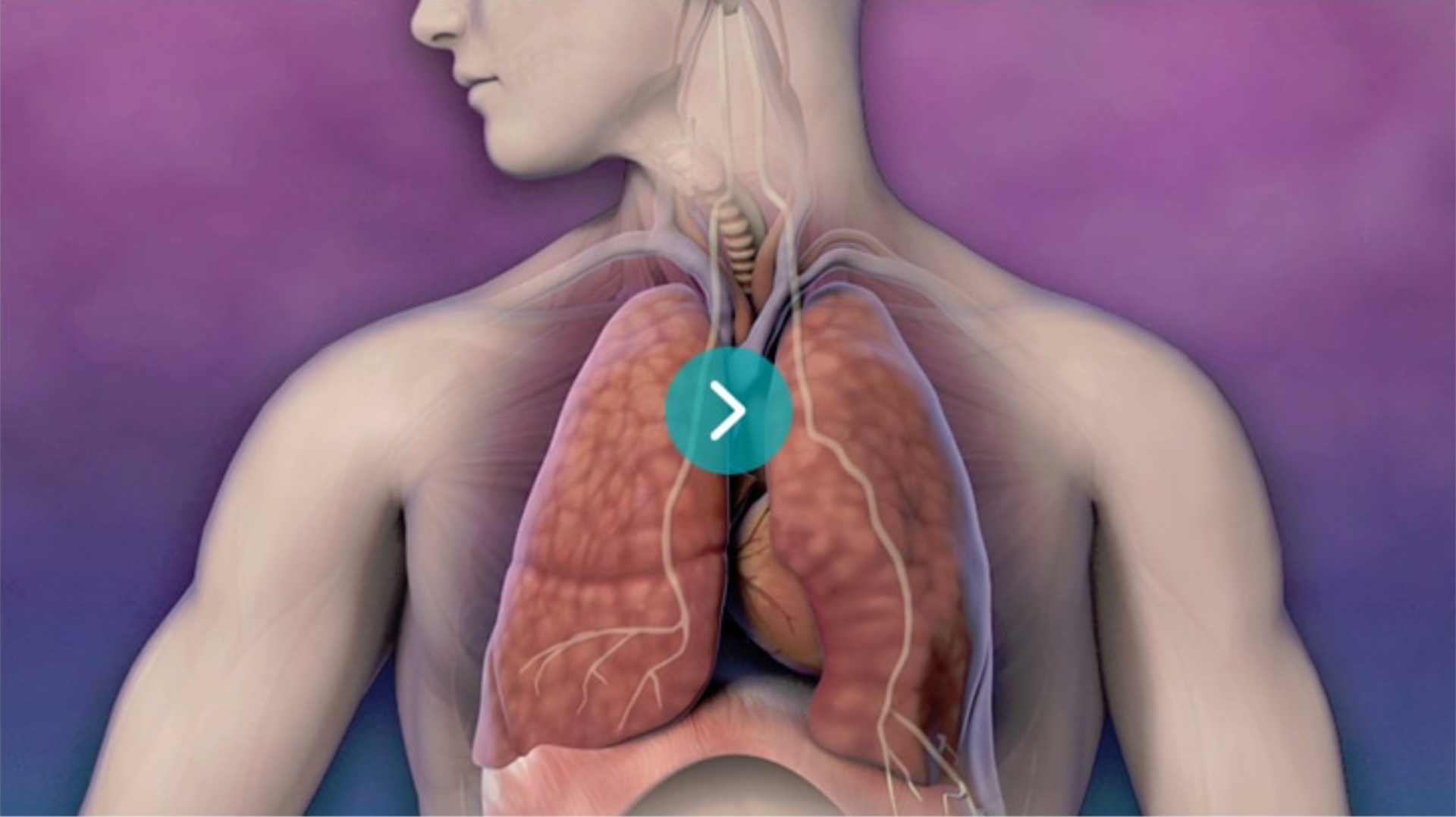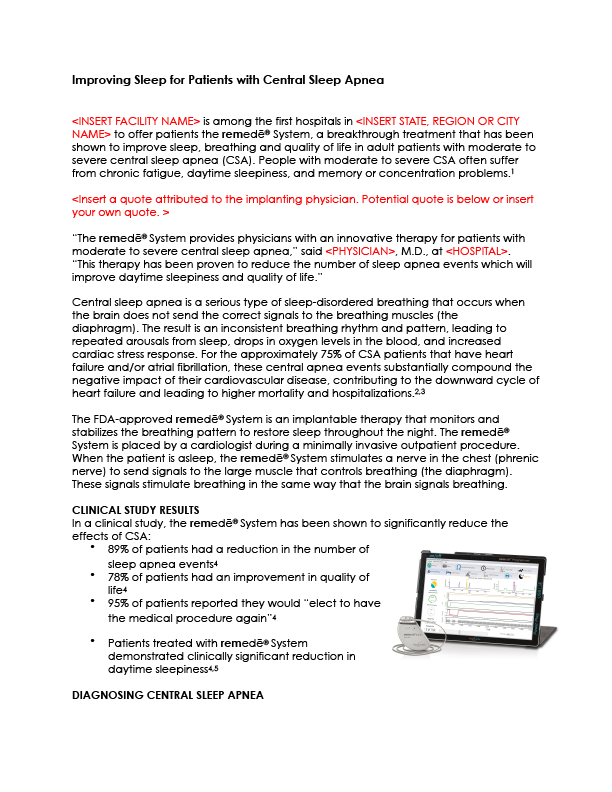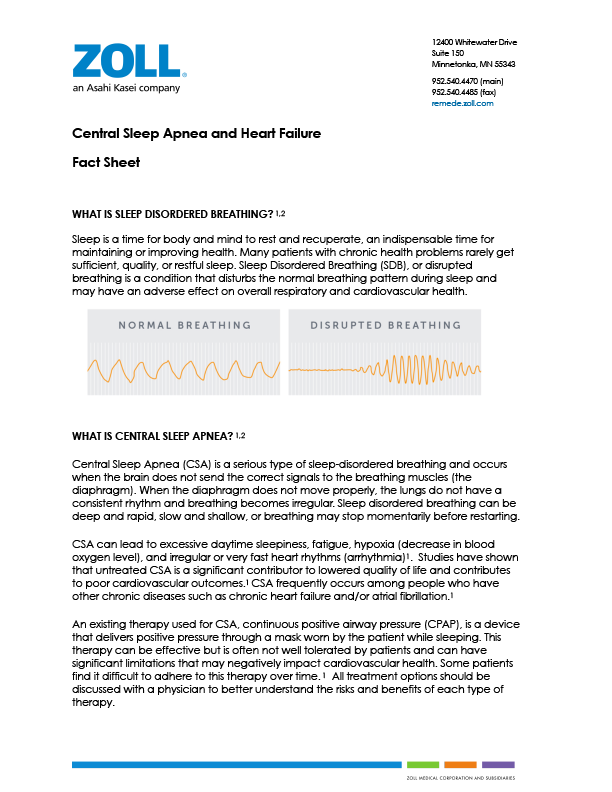Media Kit
About the remedē® System
The remedē System is a breakthrough implantable system that safely and effectively treats moderate to severe Central Sleep Apnea (CSA) in adult patients. CSA is a serious breathing disorder that disrupts the normal breathing pattern during sleep and has been shown to negatively impact quality of life and heart health.1
In a clinical study, the remedē System has been shown to improve sleep, oxygen levels and enhance overall quality of life:
- 88% of patients had a reduction in Apnea-Hypopnea Index, an indication of CSA severity2,3
- 78% of patients had an improvement in quality of life3
- 90% of patients were free from serious adverse events related to the implant procedure, the device, or delivered therapy at 12 months2
- Costanzo MR, Khayat R, Ponikowski P, et al. State-of-the-art review: Mechanisms and clinical consequences of untreated central sleep apnea in heart failure. J Am Coll Cardiol 2015;65:72-84.
- Costanzo M, et al. Transvenous neurostimulation for central sleep apnoea: a randomised controlled trial. The Lancet. 2016; 388: 974–82.
- Costanzo MR, Ponikowski P, Javaheri S, et al. Sustained Twelve Month Benefit of Phrenic Nerve Stimulation for Central Sleep Apnea. Am J Cardiol. 2018. pii: S0002-9149(18)30258-3. doi: 10.1016/j.amjcard.2018.02.022.
Media Contact
Seamus Jackson
Vice President of Global Marketing
sjackson@zoll.com
Downloads





Images or video provided courtesy of ZOLL Medical Corporation.
The remedē® System Clinical Trial News Releases
remedē® System Receives FDA Approval
OCTOBER 10, 2017
Breakthrough Treatment of Moderate to Severe Central Sleep Apnea in Adult Patients Now Available
MINNETONKA, MN – October 10, 2017 – Respicardia, Inc., a private medical technology company, announced today that it received U.S. Food and Drug Administration (FDA) approval of its remedē® System, a transvenous implantable neurostimulation system that stimulates the phrenic nerve, and engages the diaphragm to restore natural breathing during sleep in patients with central sleep apnea (CSA). The regulatory approval was based on findings from the remedē System pivotal trial, which demonstrated that transvenous neurostimulation with the remedē System can significantly reduce the severity of CSA, improve sleep, quality of life and patient satisfaction. The data from the pivotal trial were published in The Lancet in September 2016.
The remedē System is indicated for the treatment of moderate to severe CSA in adult patients. CSA is a serious breathing disorder that disrupts the normal breathing pattern during sleep and negatively affects quality of life and overall cardiovascular health. CSA results from the brain’s inability to send appropriate signals to the respiratory muscles to stimulate breathing.
“We are thrilled the remedē System received FDA approval and are excited to provide this safe and effective therapy that is proven to improve the quality of life for CSA patients,” said Bonnie Labosky, President and CEO of Respicardia. “This is a significant step forward in our efforts to offer clinicians a breakthrough and effective treatment option for their patients with CSA.”
Current treatment options are limited and there is a large unmet need. The remedē System’s novel approach to treating CSA is a physiologic treatment that creates negative pressure to move air into the lungs, similar to normal breathing. The system initiates therapy automatically and continues throughout the night without the need for a patient to apply any external equipment.
“The patients at our center treated with the remedē System experienced outstanding results and significant reduction in their CSA symptoms,” said Maria Rosa Costanzo, MD, Principal Investigator of the remedē System Pivotal Trial. “Having a therapeutic option for patients with CSA that automatically provides therapy and works throughout the night is a breakthrough treatment for this serious breathing disorder.”
In the remedē System pivotal trial, 96% of patients were highly satisfied with their therapy. The company plans on an initial limited release that will progress to broader market commercialization.
About the remedē System Pivotal Trial
The remedē System Pivotal Trial, a prospective, multicenter, randomized controlled trial, evaluated the safety and effectiveness of transvenous phrenic nerve stimulation using the remedē System in patients with moderate to severe CSA. The primary effectiveness outcome was a comparison of the proportion of patients in the treatment versus control groups achieving a reduction in apnea-hypopnea index (AHI) of 50 percent or greater from baseline to 6 months. Clinical investigators at 31 sites in the United States and Europe implanted the remedē System in 151 patients and randomized them 1:1 to the treatment or control group. The trial met its primary endpoint for efficacy. In the modified intention-to-treat population, significantly more patients in the treatment group achieved 50 percent or greater reduction in AHI from baseline to 6 months than those in the control group with a clinically meaningful difference of 41% (p<0.0001). Additionally, the 12-month freedom from serious adverse events related to the implant procedure, remedē System or delivered therapy was 91 percent.
About Respicardia
Respicardia is a private medical technology company dedicated to improving the lives of patients by developing implantable therapies designed to improve respiratory and cardiovascular health. The company’s initial product, the remedē System, is an implantable neurostimulation system designed to restore a more normal breathing pattern during sleep for moderate to severe central sleep apnea adult patients.

